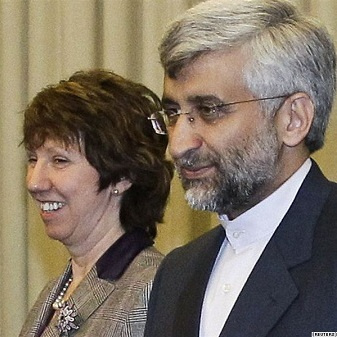Istanbul talks: A Move Forward?

One month ago, Iran and the five permanent members of the United Nations plus Germany met for the first time in 13 months in Geneva to move negotiations further—a proposition which was offered by Iran. After the negotiations drew to an end, Iran and the six world powers agreed to meet again in Istanbul, although the wording of the agreement was disputed within hours.
In another remarkable move, a letter was recently made available by senior Iranian envoy Ali Asghar Soltanieh, in which Iran has invited Russia, China, the EU, and its allies in the Arab world and developing world to tour its nuclear sites, an apparent move to gain support before the fresh round of talks with six world powers. Some diplomats and Western officials view such developments pessimistically; however, such actions and reactions means that Iran, affected by domestic and international pressures, was bitterly forced to step up efforts to achieve a comprehensive rapprochement with the West concerning continuation of its controversial nuclear activities. Iran’s leaders are aware that in such a critical situation, particularly in the field of its domestic economy which is seriously affected by UN crippling sanctions and those enforced by the West, at least within the short term they should avoid any further actions which could frustrate the new momentum created for negotiations.
Ali Akbar Salehi, the head of the Atomic Energy Organization of Iran and close ally of Ahmadinejad, who has been named caretaker foreign minister, is also a key variable for understanding new directions in Iran nuclear policy. Salehi has significant experience with life abroad. He studied at the American University in Beirut and at the Massachusetts Institute of Technology (MIT). After he fired Manouchehr Mottaki and appointed Salehi in his place, Iranian President Mahmoud Ahmadinejad said on state television that the negotiations in Geneva with the P5+1 countries had been “very good”, adding that it was time to move from the “politics of confrontation to the political agreement.”
This is the first time a possible continuation of negotiations beyond the Istanbul meeting scheduled for late January was discussed. “I hope we are moving toward understanding and cooperation. The people of Iran welcome cooperation with the great powers,” the president added. The current situation is quite appealing for negotiations, and could benefit all parties involved. In other words, the so-called crisis situation not only provides European countries with an opportunity for entering into ongoing negotiations but also for the Obama administration to resume previous diplomatic efforts for rapprochement—which were made before the disputed presidential election in Iran. American political realities strongly suggest the need for a comprehensive approach to US–Iranian diplomacy, just as mounting Iranian strategic concerns do.
Should this process proceed, it can be a prelude to further cooperation on common grounds and regional security, including the Arab–Israeli conflict, Iraq’s stability and Afghanistan, plus curbing terrorist threats and nuclear proliferation and ensuring an adequate long-term flow of oil and natural gas to international energy markets. Otherwise, and in the long-term, if the prevailing crisis condition continues, stubborn policies and radical measures will likely lead to outbreak of war in the region.

